 We had beautiful weather to play golf in today. We got some light drizzle once that just cooled us off, otherwise it was picture perfect Florida summer weather.
We had beautiful weather to play golf in today. We got some light drizzle once that just cooled us off, otherwise it was picture perfect Florida summer weather.
Here’s your winners of the tournament. The team of Atzenweiler, Mader, Moore and Steinbeck. They’re showing off their winning clubs. Second place went to my team, which included Gardner, Orwig and Wilson. Third place consisted of Behr, Bettner, Custer and Freebair. The highest scoring team was Grey, Henderson, Henderson and Lightfoot.
We had a lot of other winners, including closest to the pin #17, Tim Steinbeck, closest to the pin #2, Darrell Bruggink, longest drive #3, Molly Mader, longest drive #11, Tim O’Connell and straight drive #14, Andy Atzenweiler.
Thanks to the sponsors for making the tournament so much fun.
AgWired coverage of the Agricultural Media Summit is sponsored by:
 and
and 

 Some people call them flip flops but they also go by the name thongs. I knew the title would get your attention.
Some people call them flip flops but they also go by the name thongs. I knew the title would get your attention. The golfers are back in the club house so I’m trying to get caught up on some posts before heading over to the InfoExpo session which just got started.
The golfers are back in the club house so I’m trying to get caught up on some posts before heading over to the InfoExpo session which just got started.
 The opening reception of the AMS was a wonderful party that took place in two different locations. We started out with food in one place and the Quasimojo band in a tent at a different location. The fortunate people moved over early. The unfortunate came late and had to walk through the rain that persisted through the evening.
The opening reception of the AMS was a wonderful party that took place in two different locations. We started out with food in one place and the Quasimojo band in a tent at a different location. The fortunate people moved over early. The unfortunate came late and had to walk through the rain that persisted through the evening.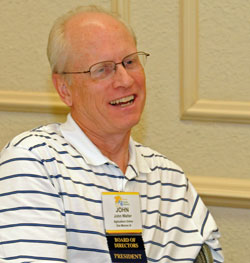 John Walter,
John Walter, 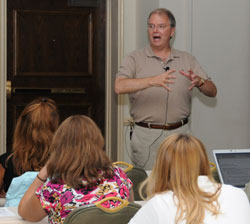 Right now the first educational sessions are taking place at the AMS. I believe this one is “Create a More Profitable Web Presence” with Don Nicholas,
Right now the first educational sessions are taking place at the AMS. I believe this one is “Create a More Profitable Web Presence” with Don Nicholas, 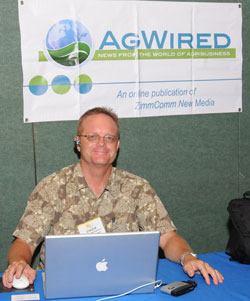 We’re going to have a live blogging extravaganza from Tampa over the next couple days. Right now we’re about to get our second thunderstorm of the day. No need to water the yard here.
We’re going to have a live blogging extravaganza from Tampa over the next couple days. Right now we’re about to get our second thunderstorm of the day. No need to water the yard here.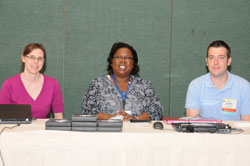 The BASF Media Room is open for business and equipped with laptop computers and wireless internet access.
The BASF Media Room is open for business and equipped with laptop computers and wireless internet access.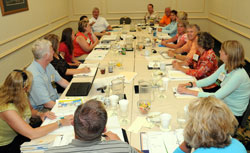 Registration is now open here at the Ag Media Summit and after lunch the first programs will start.
Registration is now open here at the Ag Media Summit and after lunch the first programs will start.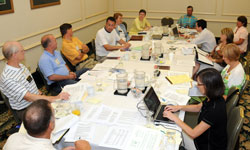 While LPC is meeting, the
While LPC is meeting, the